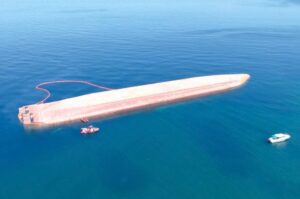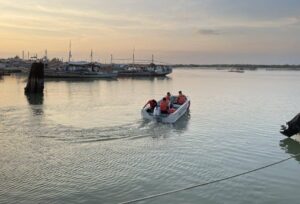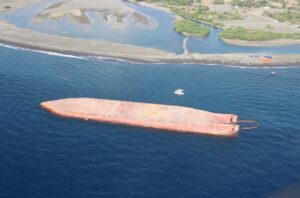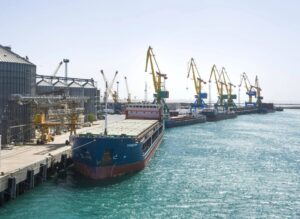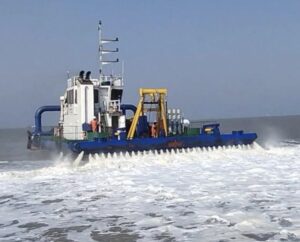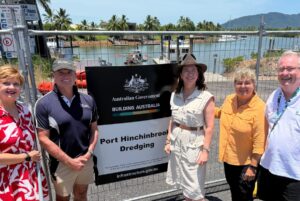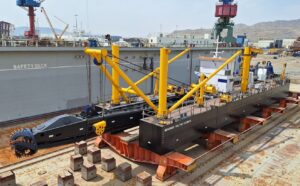EXCLUSIVE: Interview with One of the Partners of Piedroba
One of the partners of Piedroba Consulting Group (PCG) Mr. Jelle Prins has provided invaluable insight into Piedroba’s business plans in the following interview with Dredging Today.
What can you tell us about Piedroba Consulting Group?
Piedroba Consulting Group (PCG) is a Miami based marine infrastructure consultancy firm with an emphasis on dredging operations in the Americas. As a technical consultant, our efforts are mainly geared toward representing the interests of the owner, and protecting the interest of the Non-Federal Sponsor, usually the Port Authority or State Transportation Department, ensuring the timely completion of dredge work within budget, while mitigating any unnecessary risk factors or project liabilities.
As the Owner’s Representative, PCG specializes in contract administration, risk mitigation, conflict management, and cost estimating.
How has 2014 been so far for Piedroba Consulting Group?
2014 has been a great year. We have continued to prepare the United States Army Corps of Engineers staff for the management of their dredge navigation projects. We continued to teach the Dredging Fundamentals Course, an instructional concept developed by the Corps learning center in Huntsville, Alabama.
We recently hosted an exceptional class in New Orleans. We are also enjoying the privilege of working as the Owners Representative on the high profile Miami Harbor Deepening. The project is leading a transition in the way capital dredging projects are being funded in the United States.
We feel that the 2014 WRRDA (Water Resource Reform Development Act) bill has a lot of language concerning capital dredging projects that follows the PortMiami experience.
Can you tell me more about what the WRRDA bill entails?
WRRDA is a bill, used to establish both policy and authorizations for US water infrastructure.
The new legislation effectively covers all US navigable waterways, as well as other components like federal wetlands, hydroelectric interests and flood and hurricane protections. WRRDA 2014 is the first such bill presented within the post earmark era, and specific project funding is lacking. Funding within the bill is provided for blanket programs, such as the Chesapeake Waterway, but not individual projects.
The House and Senate have reached a conference agreement on the WRRDA earlier this week, and it is said to provide an $8.2 billion boost to U.S. ports and waterways. The legislative text was made public Thursday.
The aspects of the bill most interesting to our clients are the pilot programs for the modernization of Corps policies, the modifications to the Harbor Maintenance Trust Fund (HMFT), and the provision for innovative financing. The language about the Project Partnership Agreements is of specific interest to us as well.
What is the model currently being used by your client PortMiami?
Let me first say that in general we are seeing a deviation toward greater non-federal involvement in the maintenance, planning, and construction of federal waterway projects.
The difficulties in obtaining project specific funding, a general lack of federal monies for waterways, and the looming expanded capacity of the Panama Canal have changed the dynamics of projects like the Miami Harbor Deepening.
PortMiami is a seminal example of this new trend, where the Corps remains the entity undertaking the responsibility of designing, planning, and administrating the project, but a Non-Federal Sponsor undertook all financial responsibilities in order to get the project constructed, and satisfy the emerging shipping needs.
What makes the PortMiami model a successful model?
The success of the Miami model lays in its timing, as it lays out a blue print for port authorities to adjust more rapidly to market demands. By having the Non-Federal Sponsor step up and getting more heavily involved, time consuming bureaucratic hold ups are being avoided.
Our partnership with the Corps has proved itself to be powerful force allowing us to coordinate the effort of undertaking this project, and develop methods and resources which our client PortMiami can draw upon to successfully mitigate the project’s risk factors.
What is your role in the success of the PortMiami model?
Capital dredging projects often present numerous challenges. By developing a successful risk mitigation strategy and by steering certain risky aspects of the project, we have been able to preemptively limit the exposure of our client to unnecessary liability.
The fundamental risk factors for PortMiami reside in the financial obligations undertaken. Just as with most things, when you pay for something and it doesn’t work out the way you want it to, there’s a risk of losing your investment, or having to pay extra. In this case, PortMiami, and by extension its affiliated sponsor the State of Florida, bear sole financial responsibility for any and all cost overruns associated with the project.
At the same time they’d like to see the project come in on time and with the least amount of unnecessary headaches. We are essential in making that happen.
Which markets are currently in the focus of Piedroba, and do you have plans to expand your business areas?
We are optimistic about the future; the WRRDA bill is positive news for our industry and we see opportunities to strengthen our position in the domestic market. At the 30,000 foot level we see trends that are the key drivers for growth at ports and in the energy markets.
The demand for larger and deeper ports associated with infrastructure to accommodate larger oceangoing vessels with deeper drafts remains, and the design and construction of new ports on behalf of governments and port operators will remain an important market for us.
The ongoing Panama Canal Expansion is certainly supporting this assessment. We feel that our clients need us to provide turnkey solutions to some of the challenges they face when undertaking these types of projects, and in order to meet these client requirements we need to offer strategies and services that complement and strengthen one another, such as risk management and project management experience.
We’d like to continue to strongly position ourselves throughout the Americas in this segment.
About Jelle H.L. Prins
Jelle Prins, one of the partners of Piedroba Consulting Group (PCG), runs the company’s operational activities, strategic planning, and business development. Mr. Prins’ efforts have helped PCG engage in contracts with both public and private entities.
As a consultant, he specializes in strategic planning, government procurement, and contract administration. He is one of the Assistant Instructors for the United States Army Corps of Engineers’ ‘Dredging Fundamentals Course’.
Mr. Prins holds a Master of Science in Economic Geography and International Economics from the University of Utrecht, The Netherlands. He performed his Master Thesis research while at the National University of Costa Rica at Heredia, Costa Rica and took Masters of Business Administration (MBA) classes at the University of Florida.
Dredging Today Staff, May 17, 2014



